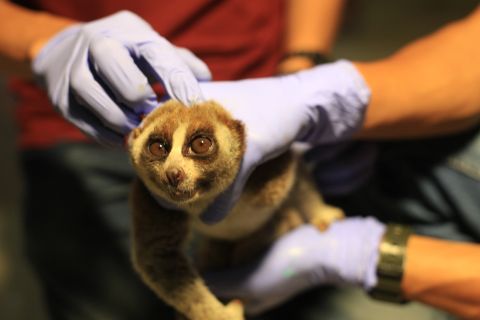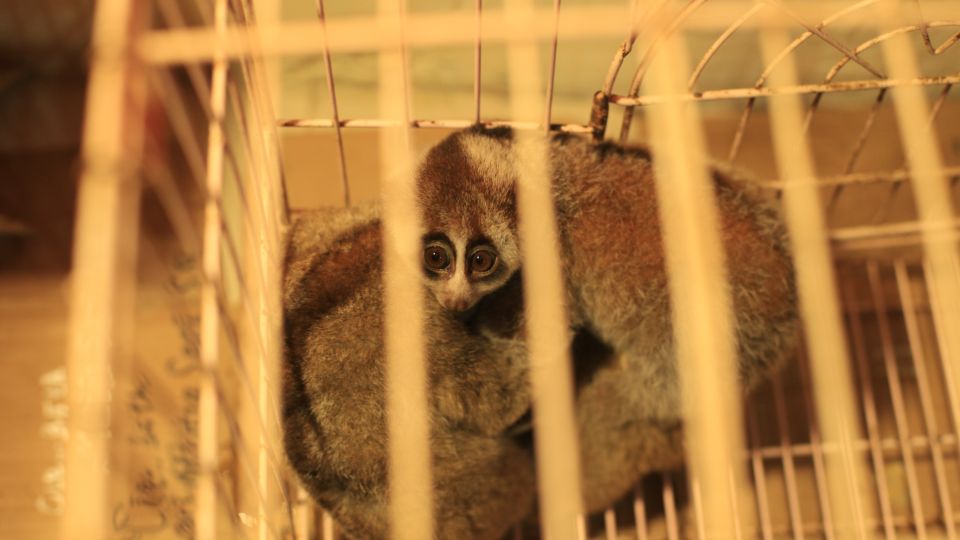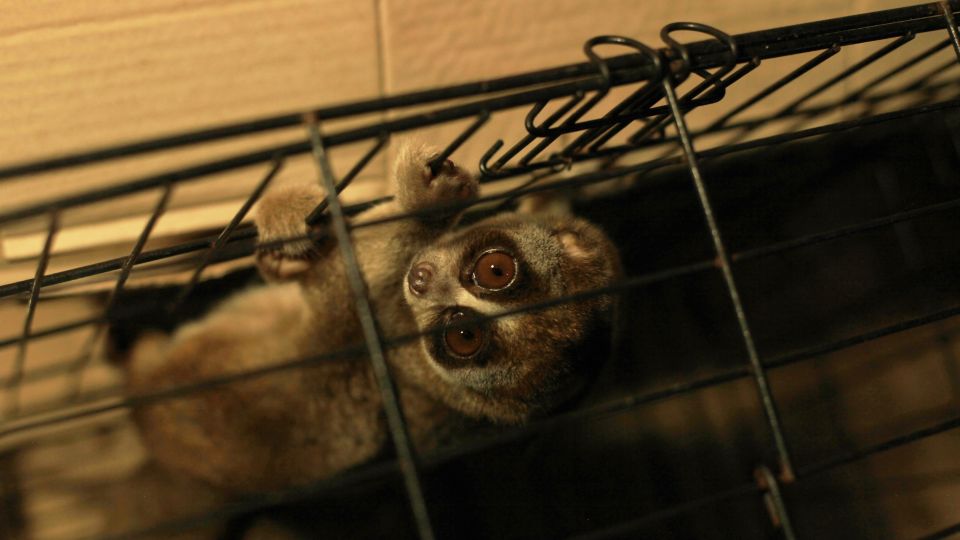
Nine Sumatran slow lorises have been recovered from a suspected illegal trade network in West Sumatra, Indonesia.
The Rapid Response Police Unit (SPORC) of the Environment and Forestry Protection and Law Enforcement Agency carried out the successful operation. Police raids conducted on 20th and 21st September dismantled the illegal wildlife cyber-trade network who used Facebook to sell wildlife. The two perpetrators were arrested and taken to the police headquarters of West Sumatra.
“Our agents have taken both the animals and perpetrators into custody,” said Khairul, Investigator of the Environment and Forestry Protection and Law Enforcement Agency, “and the suspects are liable to prosecution and will receive legal charges”.

The nine slow lorises have been assessed and treated by our team, who were present at the seizure. Imam Arifin, wildlife veterinarian at IAR Indonesia, commented: “The lorises are in reasonable condition, even though they were found in severe distress. They still display wild behaviour indicating that they might have been recently captured from the wild. Their teeth are also still intact, so they can be safely released soon.”
The animals rescued include a mother and baby. Sadly one loris had died, perhaps as a result of suffocation after being confined in a cramped, airless box by the traffickers.
The surviving lorises will be taken to Kalaweit’s Supayang Gibbon Conservation centre two hours by road from Padang. The Kalaweit programme, established in 1999, runs two rescue and rehabilitation centres for gibbons and siamangs on Borneo and Sumatra.
After this successful operation, Edward Hutapea, Head of the Environment and Forestry Protection and Law Enforcement Agency in Pekanbaru, stated: “It is important to tackle these criminal networks to stop wildlife trafficking.” He added that wildlife crime not only relates to people trading in wildlife. He said: “The illegal keeping of wildlife is also against the law and must be tackled as well.”

He urged everyone keeping wildlife as pets to immediately surrender their animals to the authorities. Those that fail to do so would be charged for illegal possession of protected wildlife. Hutapea continued: “To keep wildlife in captivity is an activity responsible for the death of many animals that won’t survive for future generations”.
In recent years, social network platforms have been increasingly used by wildlife smugglers for their illegal trading activities. Facebook is one of the most popular and is considered a safe means to offer and sell wildlife.
“With the increased use of social networks for wildlife trafficking, we have also seen an increase in the demand for wildlife and wildlife products by the general public,” said Christine Rattel, Programme Advisor at IAR Indonesia. “It’s increasingly challenging to tackle wildlife trade networks and it’s up to the public to reduce the demand in wildlife and to give all animals a chance to survive in the wild”.
Experts have been sounding the alarm over the massive declines in animal species and vast extinction trends across the globe, causing the loss of billions of animal populations in recent decades. These mass extinctions are often prompted by the illegal wildlife trade.
IAR Indonesia has rescued more than 800 slow lorises since 2008, most of which had been captured for the illegal trade.
Karmele Llano Sanchez, Programme Director of IAR Indonesia stated: “If people want to have wildlife as pets at home, or to watch YouTube videos in which animals are exploited, they must realise that this is the one of the main factors behind wildlife trafficking. While there is a demand for these animals, we will never be able to stop wildlife trade.”

Two years ago, we launched a campaign asking people not to watch YouTube videos portraying slow lorises as pets because they are a protected species in all habitat countries in South East Asia. We also appealed to YouTube to take down those videos which could be responsible for the increase in demand for them as pets and in turn fuelling the illegal pet trade.
“We urge Facebook to support efforts to stop wildlife trafficking by blocking and reporting Facebook users who advertise or post pictures of protected wildlife,” Sanchez added. “This will be a major step in cracking global illegal wildlife trade. If Facebook cares for the creatures on our planet, they must do something to help them”.

